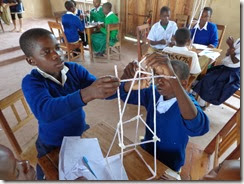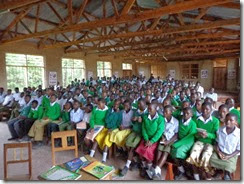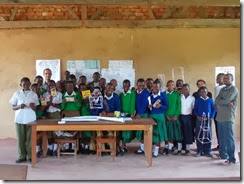In keeping with my extension goal of becoming a “Traveling Science Man” in Tanzania, in early February I took a trip to the valley/bowl of Mbinga, a small town near Songea known for its coffee production and less-than extensive diet consisting mainly of ugali wa mihogo (a lump of starch made from cassava flour). Another extending volunteer from my original Peace Corps class helped to host the 2-day competition between his school and that of another nearby volunteer.
The visiting school wasn’t able to come the first day, so we did a sort of preliminary competition among four teams from the host Mikalanga Secondary School, with student participants coming from all Forms (I-IV). From there, two teams advanced to take on the rival Hagati Secondary, which was represented the next day with four teams of its own. The host school was definitely seen as the underdog, since Hagati students have traditionally performed better on national examinations, and they are considered the more coveted school in the area for those families that can afford the higher school fees.


Mbinga students have fun playing with magnets and building towers out of straws.
In the end, however, it was one of the Mikalanga teams that proved victorious, after completing a variety of the staple events such as Egg Drop, Bridge Challenge (teams buy all building materials using a few Science Shillings), Raft Rally (build a raft from aluminum foil), Jenga Jengo (make the tallest building out of straws) and some fun math and logic puzzles. The students were really excited at exceeding their own expectations for themselves and their school, and according to the volunteer at Mikalanga, they were able to show off at the morning assembly the following Monday.


Mikalanga students show up to cheer on their school’s teams; participants pose with PCV and Tanzanian teachers who came to support the science competition.
This competition was a great and unique experience for me because the host school Mikalanga is one of the lowest performing secondary schools in the region, and has only recently gotten a couple of science teachers, meaning that many of the students there have not studied math or science for their entire high school education. Coming to that kind of setting to do a science competition reminded me of the real value of doing these kinds of events. At least for me, it’s not so much about getting every student to understand all of the concepts being talked about or necessarily showing immediate improvement on exams as it is about getting students to make some positive associations with math and science rather than just writing them off as “very difficult,” or in the case of math, “ugonjwa wa taifa” (“national disease”). Getting to see an entire school of underperforming students who have never left their home village cheering, standing on tables to watch bridge testing and intently listening to a butchered Swahili explanation of Archimedes’ Principle was a great motivation for me and a reminder of the reason why I wanted to extend my service in the first place. Many thanks to Mikalanga and Hagati schools for participating and for hosting me!
One of the perks of visiting the volunteer’s site near Mbinga was its proximity to Lake Nyasa (or Lake Malawi), which means delicious fresh fish was only a 12 hour hike away. Luckily for me, Jerome was coming back from the lake anyways, and so he shared with me some of the best fish I’ve ever had. Also on the menu for the weekend was a slightly less traditional delicacy, pigeon. Jerome’s neighbors had recently started raising a small pigeon farm of sorts, which were apparently not the best courtyard-mates, so he was pretty pleased with the idea of taking them off their hands. Turns out, when they’re not bathing in sewers and eating city trash, pigeons aren’t all that bad (sometimes the stereotype “tastes like chicken” is perfectly valid). Nonetheless, this is definitely an experience I don’t need to recreate in America.
In other news, our Shika na Mikono science team has selected its newest members from the most recent group of Education volunteers. Of course myself and the rest of the current team will still be around for a while, but we wanted to incorporate the new people as early as possible so that we can hand things off better over the course of several months rather than a couple weeks, which is how it’s been done in the past. We will all be gathering in Morogoro in mid-March to do a Science Day at a nearby volunteer’s school so that the new group can get some experience in preparing for and conducting such events and trainings. The Shika team has made such great progress in working with the Ministry of Education over the past year that we want to make sure that that relationship continues to grow in years to come.
So more on that to come shortly, as well as a recap of a math Pi Day celebration on 3/14, so stay tuned!
No comments:
Post a Comment